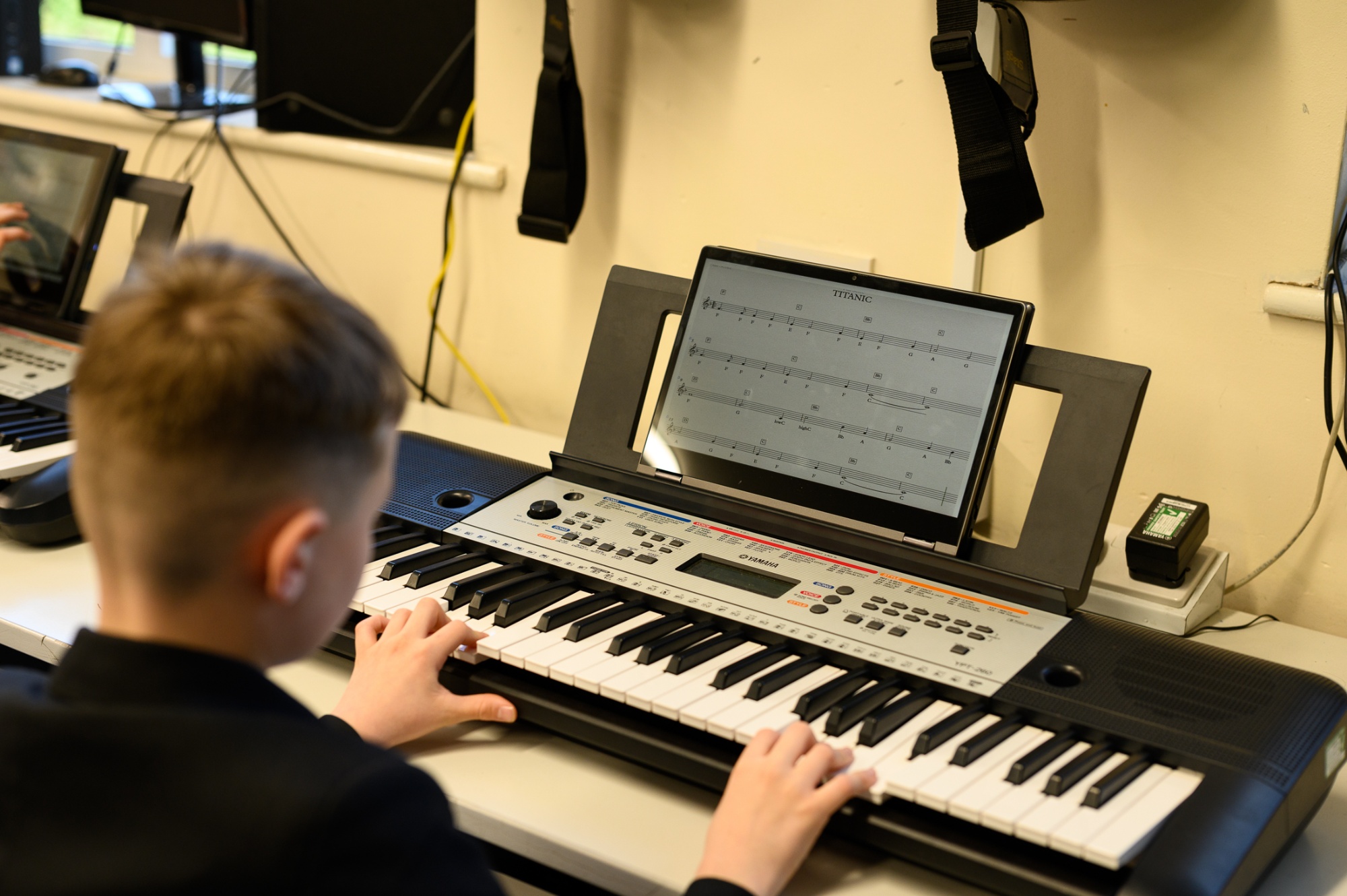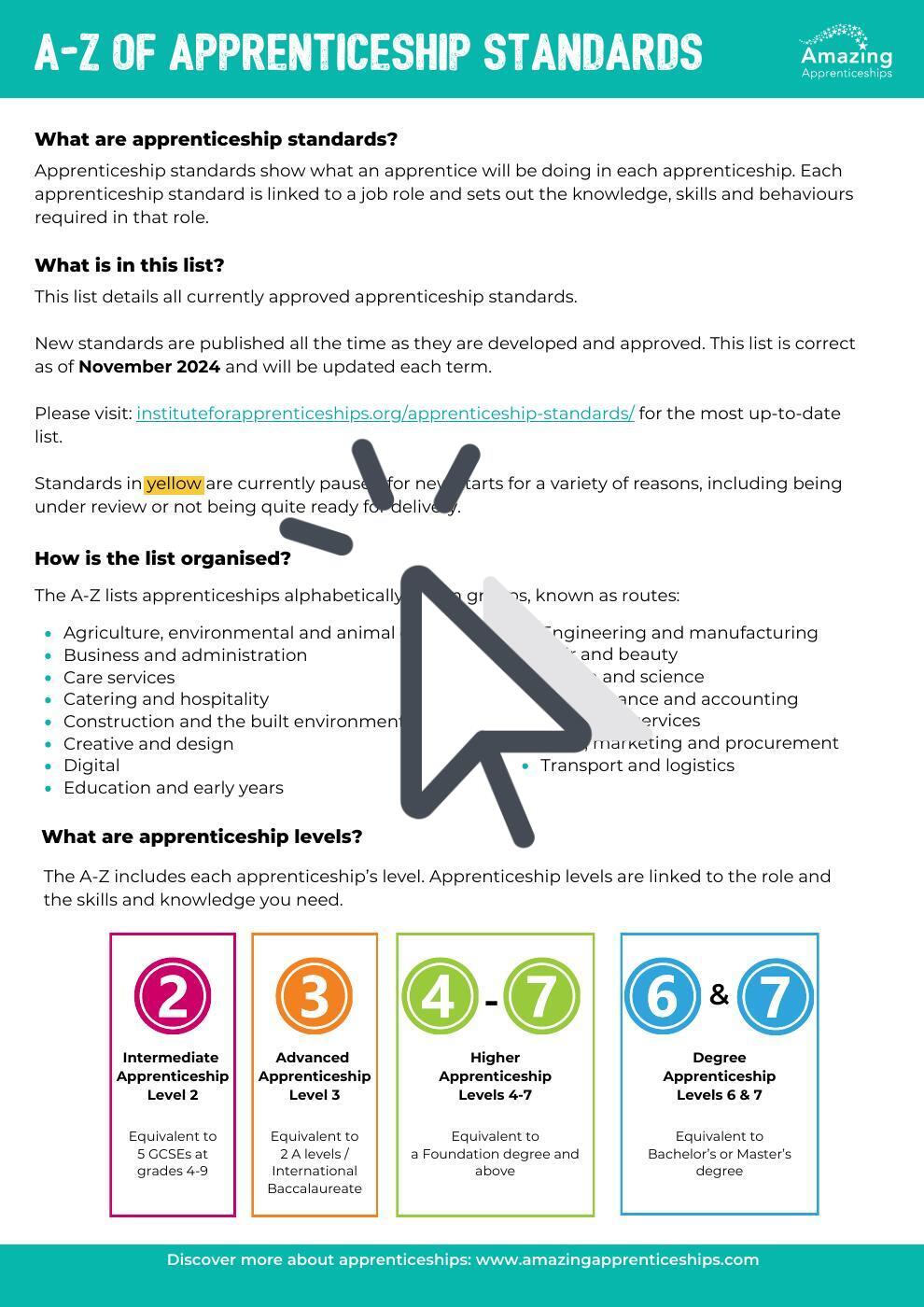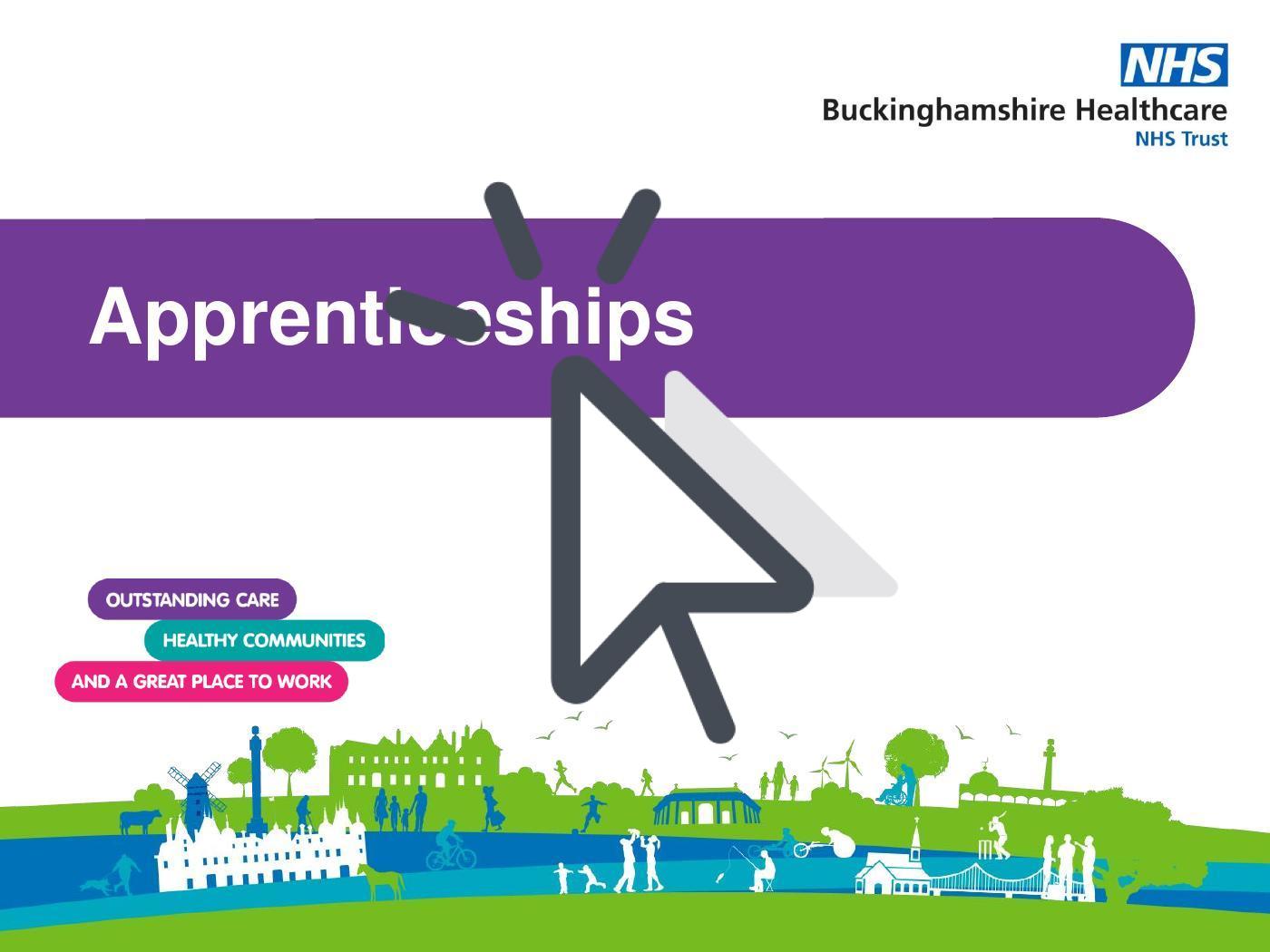Apprenticeships
What is an Apprenticeship?
Earn while you learn. An apprenticeship is a paid period of training that allows you to learn a particular skill or set of skills and can last between one and four years.
What are my options?
Apprenticeships are an exciting option - you get hands-on training and also the chance to put your skills into practice.
Apprenticeships are available at multiple levels. From school-leavers, people upskill in their careers and complete career changes. There are hundreds to choose from and some include a qualification, like a degree.
There are three levels of apprenticeship:
- Apprenticeships
- Advanced apprenticeships
- Higher apprenticeships
- Degree apprenticeships
What you'll earn
What you earn will depend on the industry, location and type of apprenticeship you choose.
If you're aged 16 to 18 or in the first year of your apprenticeship, you’re entitled to the apprentice rate (link).
If you're 19 or over and have completed the first year of your apprenticeship, you’re entitled to the National Minimum Wage (link).
This is the minimum you’ll earn - many employers pay a lot more and offer their apprentices a competitive salary.
What it costs
Apprenticeships are funded from contributions made by the government and your employer. This means you will not have any student loans or tuition fees.
You'll just need to cover the cost of your day-to-day expenses, such as lunch and travel.
If you're 16 to 24 and a care leaver, you'll receive a £1,000 bursary payment to support you in the first year of your apprenticeship.
Bucks Skills Hub Apprenticeships Vacancies
Please see this document for all the available local apprenticeship openings as of April 2024.
Apprenticeship Levels Explained
-
Intermediate Apprenticeship - These are the same level as GCSE or Level 2 Functional Skills Qualifications.
-
Advanced Apprenticeship - These are the same level as A-Level or Level 3 BTEC Qualifications. It would help if you had Maths and English GCSEs for these apprenticeship opportunities.
-
Higher Apprenticeship - These are the same level as a HNC (Level 4) or HND (Level 5) qualification. These count as Higher Education and usually lead to degree apprenticeships.
-
Degree Apprenticeship - These are the same level as a Bachelor's Degree (Level 6) or Master's Degree (Level 7). It can take 3 to 6 years to complete, depending on the course and qualification.
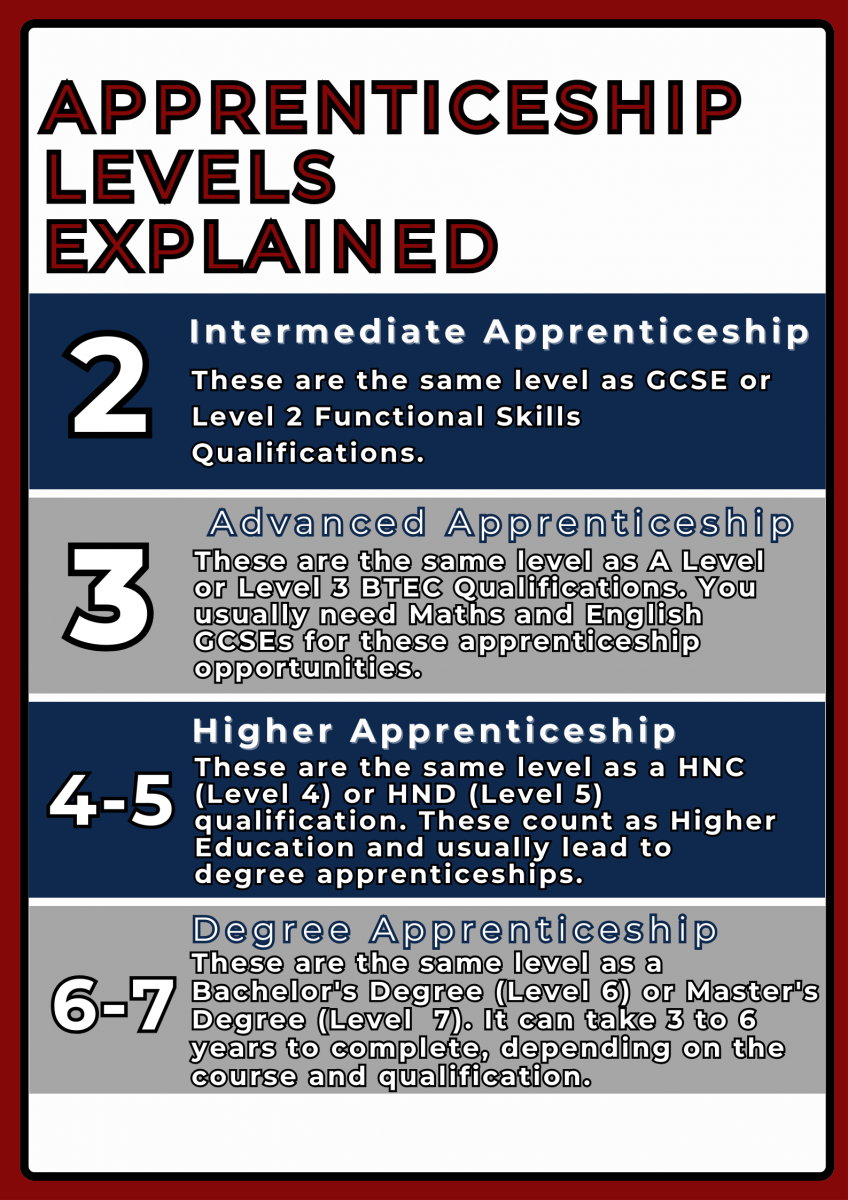
Apprenticeship Opportunity Websites
- gov.uk/apply-apprenticeship
- gov.uk/government/publications/higher-and-degree-apprenticeships
- findapprenticeships.co.uk/
- Foreign and Commonwealth Apprenticeships
- apprenticeships.gov.uk/
- Not Going to Uni
- Indeed.com
- www.apprenticeships.gov.uk
- https://www.getmyfirstjob.co.uk/
- https://notgoingtouni.co.uk/opportunities
Amazing Apprenticeships
Explore 250+ Higher and Degree Apprenticeship vacancies from 50+ employers, including @amazon, British Airways, Rolls-Royce, HSBC, Morrisons, Transport for London, JCB, and many more!
amazingapprenticeships.com/zones/student/
Explore 2,400 Higher and Degree apprenticeship vacancies from 80+ employers, including Accenture, AstraZeneca, British Army, Dunelm, EDF, IBM, KPMG, Network Rail, Nestle, Rolls-Royce, Siemens, Thames Valley Police, Vodafone and many more!
Download the Higher & Degree listing using the PDF button below.
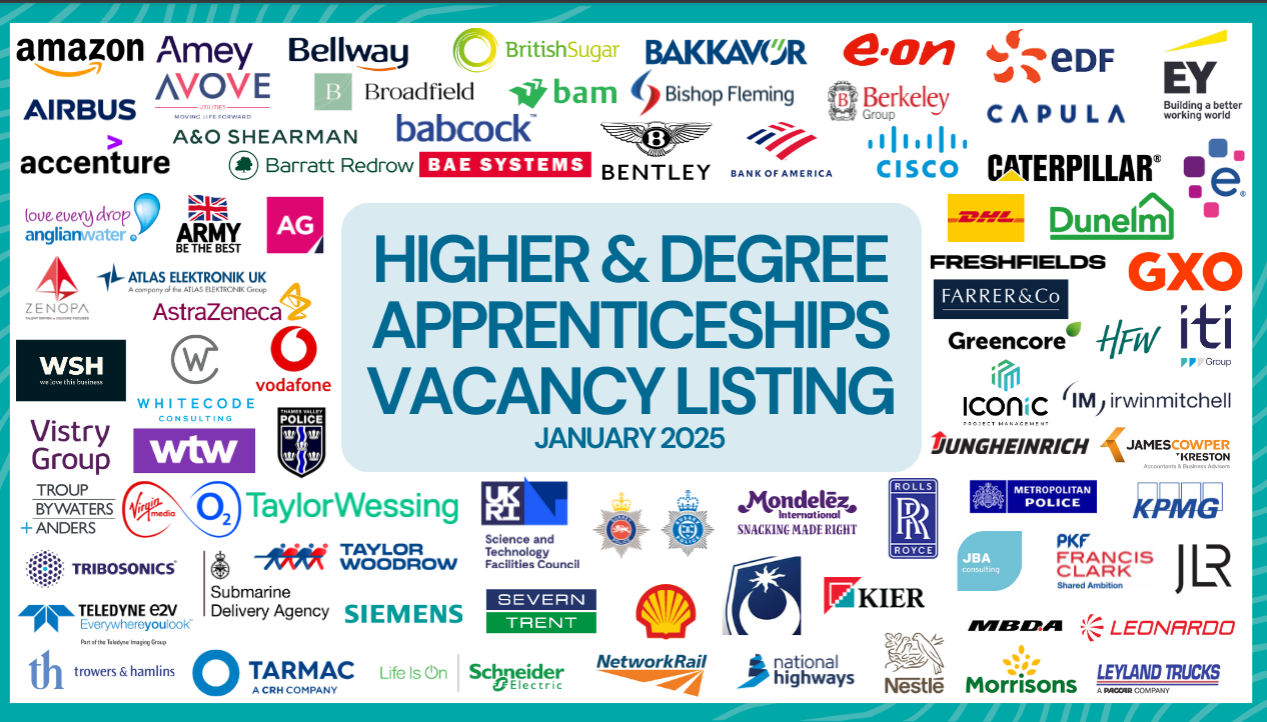
Register For Upcoming Webinars
A series of informative webinars for teachers, careers advisers and parents that will provide an abundance of tips, advice, and information around the topic of apprenticeships.
Each webinar lasts between 30 – 60 minutes and takes place on Zoom. Participants are required to sign up before the session and will receive an email confirmation and a reminder an hour before it begins. The webinars are recorded and shared with all registrants after the session.
Apprenticeship Opportunities with Buckinghamshire Healthcare NHS Trust
Earn, learn and make a difference with an NHS apprenticeship. Our apprenticeships offer routes into many of the more than 350 NHS careers through a mix of on-the-job training and classroom learning.
What you need to know about NHS apprenticeships
- Many NHS employers will pay you more than the minimum wage.
- If you are aged 16 to 18 or 19+ and in your first year of an apprenticeship, the minimum you should receive is £5.28 an hour (the National Minimum Wage for apprentices).
- Apprenticeships take between one and five years to complete.
- Anyone over the age of 16 can do one.
- Over a week, you're likely to spend the equivalent of four days on work placement and one day at a training centre or college.
- You'll develop your skills, including English and maths.
- You'll gain a competence qualification (based on what you can do in the workplace) and a knowledge qualification, or a qualification combining both.
Entry requirements
Entry requirements will depend on the employer and the type and level of apprenticeship.
For example, you may need four or five GCSEs at grades 9-4/A-C or equivalent to do a level 3 apprenticeship. To start a level 5 or 6 apprenticeships, you will likely need A-Levels, equivalent Level 3 qualifications or relevant and sufficient experience.
https://www.healthcareers.nhs.uk/career-planning/study-and-training/nhs-apprenticeships

